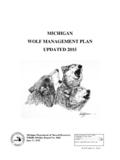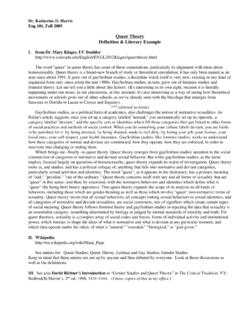Transcription of Research Philosophies – Importance and Relevance - Warwick
1 Research Philosophies Importance and Relevance Issue 1 (Jan 09) Paul Flowers 1 MSc by Research Tel: 07710 046898 Leading Learning and Change Cranfield School of Management Research Philosophies Importance and Relevance 0. INTRODUCTION When undertaking Research of this nature, it is important to consider different Research paradigms and matters of ontology and epistemology. Since these parameters describe perceptions, beliefs, assumptions and the nature of reality and truth (knowledge of that reality), they can influence the way in which the Research is undertaken, from design through to conclusions, and it is therefore important to understand and discuss these aspects in order that approaches congruent to the nature and aims of the particular inquiry are adopted, and to ensure that researcher biases are understood, exposed, and minimised.
2 Whilst James and Vinnicombe (2002) caution that we all have inherent preferences that are likely to shape our Research designs, Blaikie (2000) describes these aspects as part of a series of choices that the researcher must consider and he shows the alignment that must connect these choices back to the original Research Problem. If this is not achieved, methods incompatible with the researcher s stance may be adopted, with the result that the final work will be undermined through lack of coherence. Blaikie (1993) argues that these aspects are highly relevant to Social Science since the humanistic element introduces a component of free will that adds a complexity beyond that seen in the natural sciences and others, such as Hatch and Cunliffe (2006) draw attention to the fact that different paradigms encourage researchers to study phenomena in different ways , going on to describe a number of organisational phenomena from three different perspectives, thus highlighting how different kinds of knowledge may be derived through observing the same phenomena from different philosophical perspectives.
3 As well as stimulating debate, Denzin and Lincoln (2003) and Kvale (1996) highlight how these different positions can result in much tension amongst academics. This essay aims to discuss these factors in more detail, demonstrate awareness and understanding and conclude by describing the approach to be undertaken in this study, as a prelude to the full Research design. 1. ONTOLOGY Blaikie (1993) describes the root definition of ontology as the science or study of being and develops this description for the social sciences to encompass claims about what exists, what it looks like, what units make it up and how these units interact with each other . In short, ontology describes our view (whether claims or assumptions) on the nature of reality, and specifically, is this an objective reality that really exists, or only a subjective reality, created in our minds.
4 Hatch and Cunliffe (2006) use both an everyday example, and a social science example to illustrate the point. For the everyday example, they use the example of a workplace report asking one to question whether it describes what is really going on, or only what the author thinks is going on. They go on to highlight the complexity that is introduced when considering phenomena such as culture, power or control, and whether they really exist or are simply an illusion, further extending the discussion as to how individuals (and groups) determine these realities does the reality exist only through experience of it (subjectivism), or does it exist independently of those who live it (objectivism). As a result, we all have a number of deeply embedded ontological assumptions which will affect our view on what is real and whether we attribute existence to one set of things over another.
5 If these underlying assumptions are not identified and considered, the researcher may be blinded to certain aspects of the inquiry or certain phenomena, since they are implicitly assumed, taken for granted and therefore not opened to question, consideration or discussion. Research Philosophies Importance and Relevance Issue 1 (Jan 09) Paul Flowers 2 MSc by Research Tel: 07710 046898 Leading Learning and Change Cranfield School of Management When considering that different views exist regarding what constitutes reality, another question must be how is that reality measured, and what constitutes knowledge of that reality.
6 This leads us to questions of Epistemology. 2. EPISTEMOLOGY Closely coupled with ontology and its consideration of what constitutes reality, epistemology considers views about the most appropriate ways of enquiring into the nature of the world (Easterby-Smith, Thorpe and Jackson, 2008) and what is knowledge and what are the sources and limits of knowledge (Eriksson and Kovalainen, 2008). Questions of epistemology begin to consider the Research method, and Eriksson and Kovalainen go on to discuss how epistemology defines how knowledge can be produced and argued for. Blaikie (1993) describes epistemology as the theory or science of the method or grounds of knowledge expanding this into a set of claims or assumptions about the ways in which it is possible to gain knowledge of reality, how what exists may be known, what can be known, and what criteria must be satisfied in order to be described as knowledge.
7 Chia (2002) describes epistemology as how and what it is possible to know and the need to reflect on methods and standards through which reliable and verifiable knowledge is produced and Hatch and Cunliffe (2006) summarise epistemology as knowing how you can know and expand this by asking how is knowledge generated, what criteria discriminate good knowledge from bad knowledge, and how should reality be represented or described. They go on to highlight the inter-dependent relationship between epistemology and ontology, and how one both informs, and depends upon, the other. In considering this link, the need to understand the position of the researcher becomes more obvious. If the researcher holds certain ontological positions or assumptions, these may influence the epistemological choices or conclusions drawn.
8 Hence, as with ontology, both objective and subjective epistemological views exist. Eriksson and Kovalainen (2008) describe an objective epistemology as presuming that a world exists that is external and theory neutral, whereas within a subjective epistemological view no access to the external world beyond our own observations and interpretations is possible. Saunders, Lewis and Thornhill (2007) discuss this further, highlighting that certain researchers therefore argue that data collected from objects that exist separate to the researcher (an external reality) is less open to bias and therefore more objective, and that if social phenomena are studied, these must be presented in a statistical, rather than narrative, form in order to hold any authority, a position of course that many researchers would challenge and Blaikie (1993) contends that since social Research involves so many choices, the opportunity for researchers values and preferences to influence the process makes it difficult to ultimately achieve true objectivity.
9 These discussions lead us to the next area for consideration, which Blaikie (2000) describes as the Research paradigm and by others (Saunders, Lewis and Thornhill, 2007) as the Research philosophy . These Philosophies are formed from basic ontological and (the related) epistemological positions, and have developed in both classical and contemporary forms to effectively classify different Research approaches. Denzin and Lincoln (2003) describe a Research paradigm as an interpretive framework and in borrowing from Guba, as a basic set of beliefs that guides action . The next chapter considers three key paradigms those of positivist ( classical ), interpretivist / constructivist ( classical ) and realist (contemporary).
10 3. Research PARADIGMS Three key paradigms are briefly discussed, and a simple classification used to distinguish the key components. These paradigms are chosen not only for their prevalence in management Research , but because they effectively form the poles from which other paradigms are developed or derived. Often, different names are used to describe apparently similar paradigms; in part this is as a result of similar approaches being developed in parallel across different branches of the social sciences. Research Philosophies Importance and Relevance Issue 1 (Jan 09) Paul Flowers 3 MSc by Research Tel: 07710 046898 Leading Learning and Change Cranfield School of Management Positivist The positivist position is derived from that of natural science and is characterised by the testing of hypothesis developed from existing theory (hence deductive or theory testing) through measurement of observable social realities.



